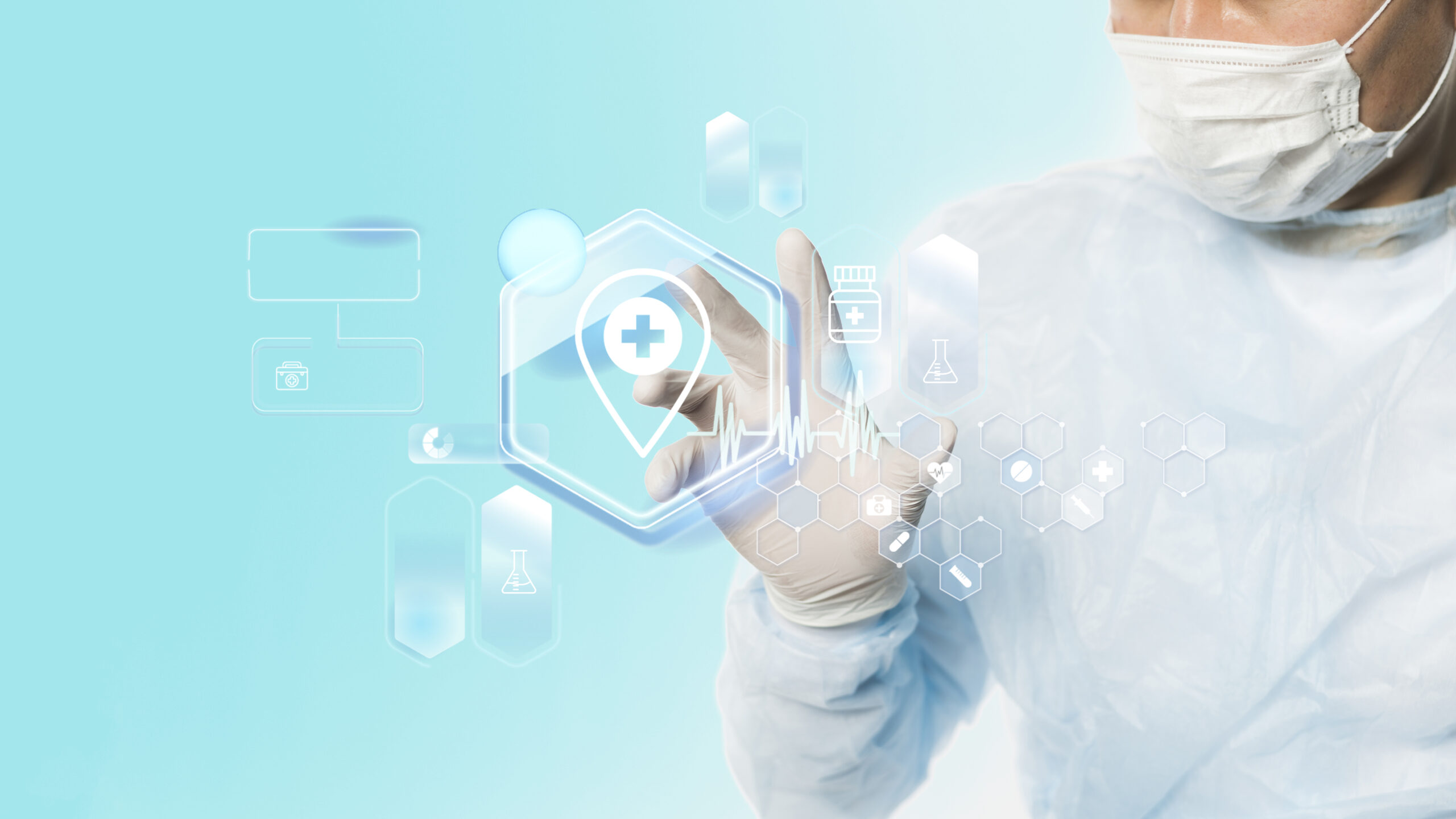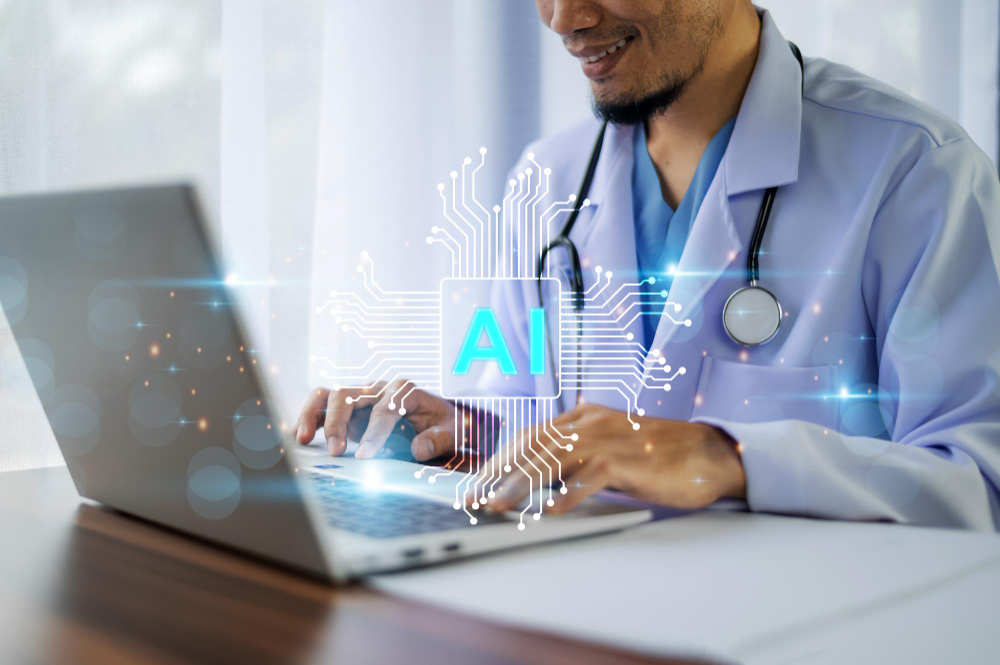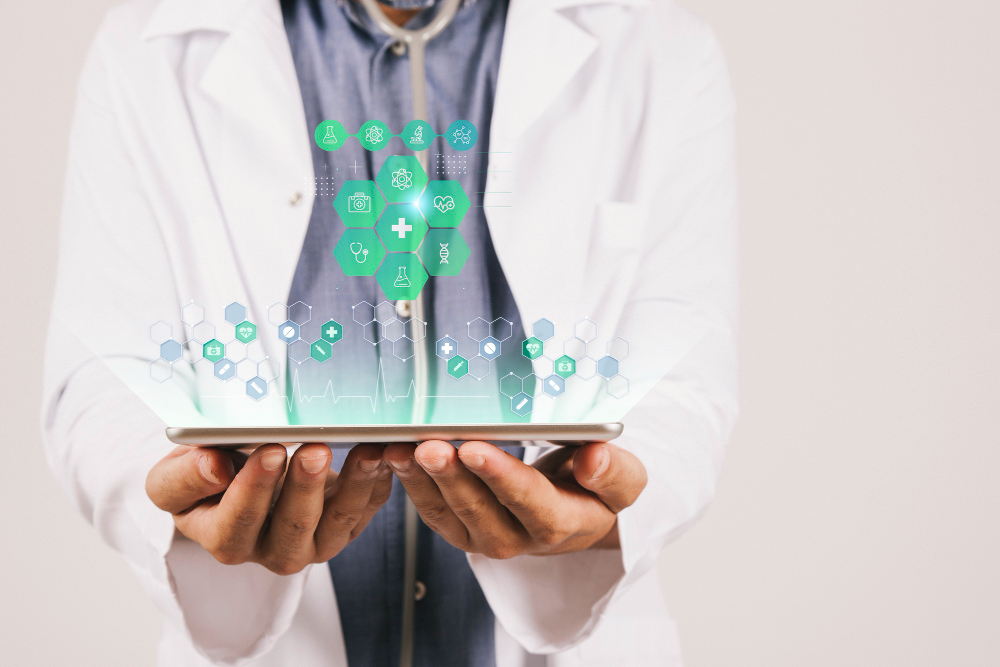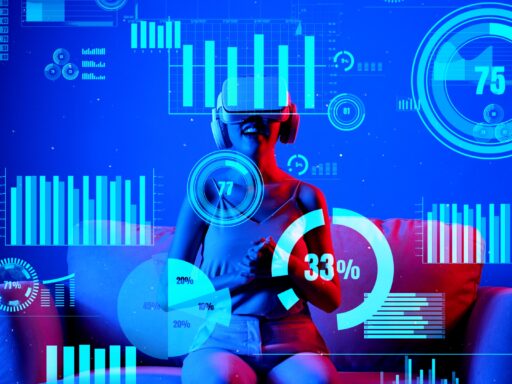AI is reshaping the landscape of healthcare, particularly in the realm of diagnostics. By leveraging advanced algorithms and machine learning, AI is revolutionizing early disease detection and prevention, significantly enhancing the way medical practitioners diagnose and treat illnesses.
This blog post delves into the transformative potential of AI-powered diagnostics, exploring how it’s poised to change the future of healthcare.
Introduction to AI-Powered Diagnostics
Regarding AI’s role in healthcare, one of the most promising areas is AI-powered diagnostic imaging. This refers to the use of Machine Learning to analyze medical images and detect diseases or abnormalities with remarkable accuracy and speed.
AI-powered diagnostics involve the use of sophisticated computer algorithms and machine learning techniques to analyze medical data and assist in diagnosing diseases. These technologies are designed to process vast datasets and identify patterns that might be overlooked by traditional diagnostic methods.
At its core, AI diagnostics aim to enhance the precision and efficiency of medical diagnoses, leading to better patient outcomes. By leveraging advanced algorithms and vast amounts of data, AI can identify patterns and anomalies that may be missed by human practitioners.
This technology not only accelerates the diagnostic process but also opens the door to early detection and personalized treatment plans, ultimately improving overall healthcare quality.
How Do AI-Powered Diagnostics Work?
The process begins with the input of comprehensive medical data into an AI system. This data can include electronic health records (EHRs), lab results, imaging scans, genetic information, and lifestyle factors. The more data the AI system can analyze, the more accurate and insightful its diagnoses become. Here’s how it works:
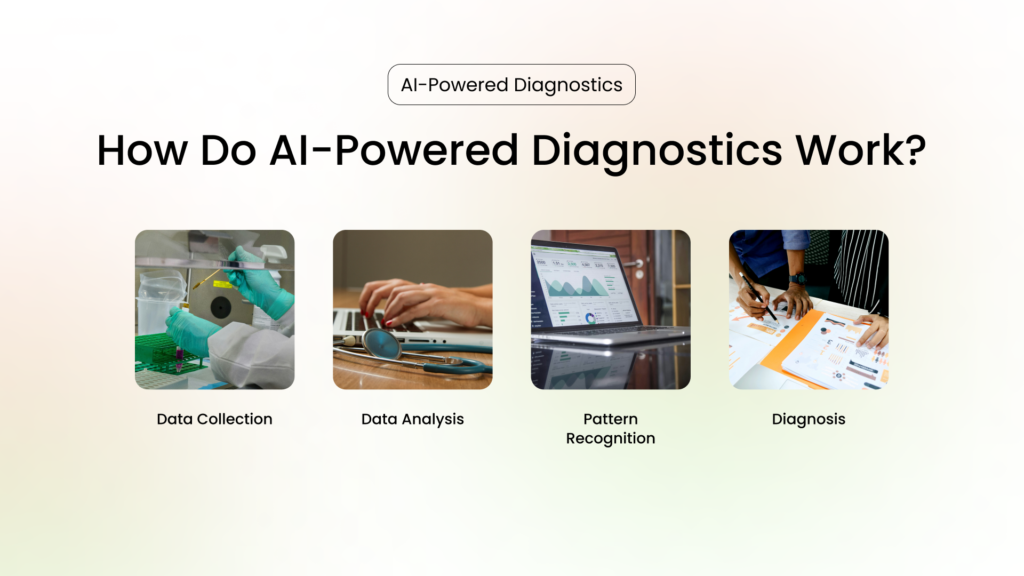
- Data Collection: Medical data from various sources, such as electronic health records, lab results, imaging studies, and patient history, is collected and fed into the AI system. Ensuring data privacy and security is a critical part of this process to maintain patient confidentiality.
- Data Analysis: The AI algorithm analyzes the collected data, utilizing advanced techniques like natural language processing and statistical analysis. This step is crucial for identifying patterns, trends, and correlations that may indicate the presence of a disease or condition, even those that might be missed by human eyes.
- Pattern Recognition: Using machine learning, the AI system continuously improves its ability to recognize specific patterns associated with different medical conditions. This iterative learning process allows the system to become more accurate over time, adapting to new data and medical research developments.
- Diagnosis: The AI provides a diagnostic output based on its analysis, offering insights that can then be reviewed and validated by medical professionals. This collaboration between AI and healthcare providers ensures that the final diagnosis is reliable and informed by both technological and human expertise.
One of the key advantages of AI diagnostics is its capacity for continuous learning and improvement. As more data is fed into the system, the AI’s accuracy and diagnostic capabilities are enhanced, making it an invaluable tool for early disease detection and prevention.
Benefits of AI-Powered Diagnostics
The integration of AI into diagnostics offers numerous benefits, particularly in the early detection and prevention of diseases. Here are some of the most significant advantages:
Enhanced Predictive Maintenance
AI is revolutionizing predictive maintenance, a critical component of many industries, including healthcare. By analyzing large datasets, AI can identify patterns that indicate potential malfunctions, enabling timely maintenance and reducing downtime and costs. This capability is crucial in healthcare settings, where equipment failures can have serious consequences for patient care.
Early Disease Detection
One of the most compelling benefits of AI diagnostics is its ability to detect diseases at an early stage. By analyzing EHRs and medical imaging, AI can identify early signs of diseases such as cancer, cardiovascular conditions, and neurological disorders.
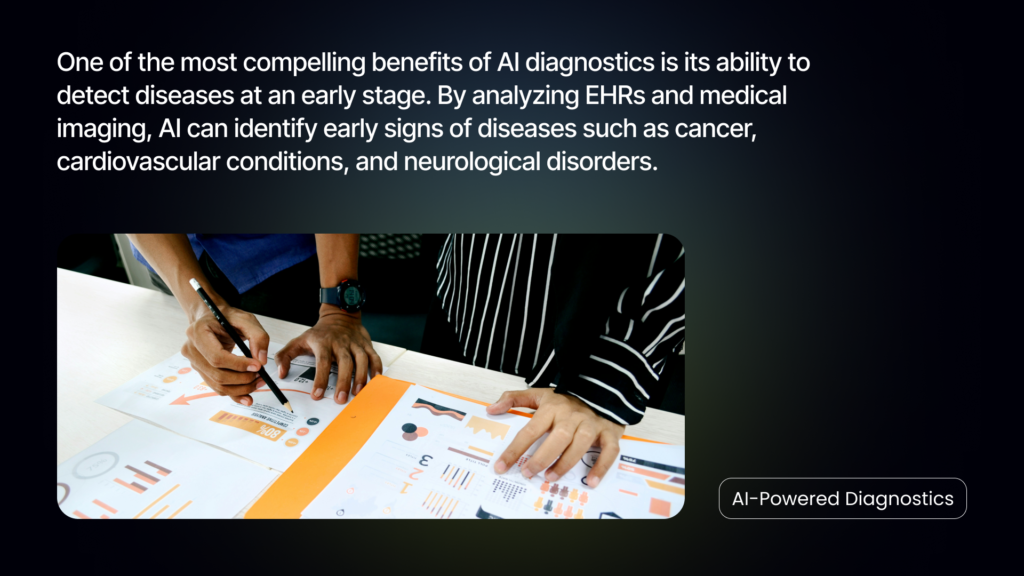
Early detection allows for prompt intervention and treatment, significantly improving patient outcomes and reducing healthcare costs.
Accuracy and Efficiency
AI-powered diagnostics provide unparalleled accuracy in detecting diseases, often surpassing human capabilities. By quickly and accurately identifying abnormalities, AI algorithms aid in early detection, leading to timely interventions and improved patient outcomes.
This efficiency enables healthcare professionals to focus on patient care rather than data analysis. Furthermore, this advancement also shortens the waiting time for patients and increases doctors’ working efficiency by aiding the diagnosing process.
Personalized Treatment Plans
AI’s ability to analyze individual patient data allows for the creation of personalized treatment plans tailored to each patient’s unique needs. This precision medicine approach ensures that treatments are more effective and patients receive the best possible care.
A notable example of AI-powered analytics in personalized treatment plans can be seen in the field of oncology. Consider a patient diagnosed with breast cancer. AI algorithms can analyze the patient’s genetic makeup, tumor characteristics, and even lifestyle factors.
By comparing this data with vast datasets of previous cancer cases, AI can predict which treatment options are the most effective for the individual. This tailored approach not only maximizes the chances of successful treatment but also minimizes adverse effects, thereby improving the patient’s quality of life during and after treatment.
The Future of AI-Powered Analytics in Healthcare
The rise of AI in diagnostic tools and predictive maintenance is revolutionizing healthcare and industrial efficiency. AI-powered diagnostics can detect diseases at an early stage, improving accuracy and speed in diagnoses, and enabling personalized treatment plans.
The future of AI in healthcare is bright, with continued advancements expected to further enhance diagnostics, treatment, and patient care. AI-powered diagnostics will continue to be significant in early disease detection and prevention, empowering healthcare professionals with superhuman abilities and ultimately saving lives.
The potential for personalized and precision medicine will further transform the way we approach healthcare.
Integration with Other Technologies
In addition to diagnostics, AI is being integrated with other emerging technologies, such as telemedicine and wearable health devices. This synergy promises to create a more connected and efficient healthcare ecosystem, where patients can receive real-time monitoring and immediate medical attention when needed.
Ethical Considerations and Challenges
While the potential of AI in healthcare is immense, it’s essential to address ethical considerations and challenges. Issues such as data privacy, algorithmic biases, and the need for regulatory frameworks must be carefully managed to ensure that AI is used responsibly and equitably.
The bottom line
AI-powered diagnostics represent a significant leap forward in the field of healthcare. By harnessing the power of AI, we can achieve early disease detection, improve diagnostic accuracy, and create personalized treatment plans that enhance patient care.
As technology continues to evolve, the integration of AI in healthcare will undoubtedly lead to a more efficient and effective healthcare system, ultimately paving the way for a healthier future.
It’s also important to work with traditional healthcare workers to ensure the accuracy of AI-powered diagnostics and enhance technological advancements. Healthcare professionals bring invaluable clinical experience and judgment that complement AI’s analytical power.
By involving doctors, nurses, and other healthcare staff in the development and implementation of AI technologies, we can achieve a balanced approach that leverages both human expertise and machine precision. This collaboration helps in validating AI-generated results and ensuring they align with real-world clinical scenarios.
Furthermore, feedback from traditional healthcare workers can lead to continuous improvements in AI algorithms, making them more robust and reliable. Ultimately, this synergy ensures that AI advancements are not only cutting-edge but also practical and beneficial in diverse healthcare settings.
In the end, AI-powered analytics has the potential to revolutionize healthcare by providing faster, more accurate, and personalized diagnostic solutions. However, responsible and ethical use of this technology is crucial to avoid unintended consequences.


